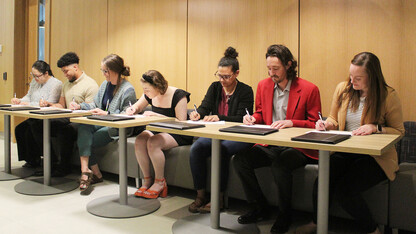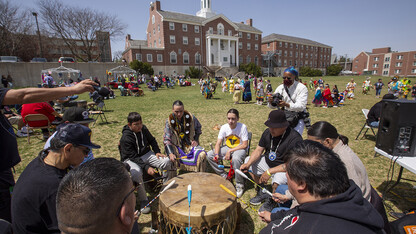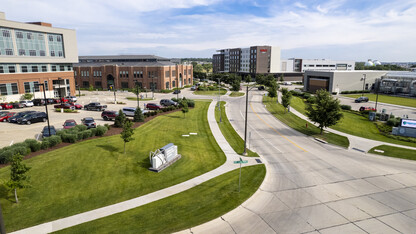· 11 min read
Nebraska in the national news: March 2020

Amid extensive coverage of the COVID-19 pandemic, a record-setting rodent made headlines in March. The stories were among 45-plus featuring University of Nebraska–Lincoln faculty, staff, students, centers and programs during the month.
During a February expedition, Jay Storz, Willa Cather Professor of biological sciences at Nebraska, discovered that the yellow-rumped leaf-eared mouse — the world’s highest-dwelling mammal — lives at higher elevations than previously thought. Storz encountered the mouse atop the summit of a volcano on the Argentina-Chile border, at 22,110 feet, breaking the world record announced just last year.
The expedition suggests “we’ve probably underestimated the altitude limits and physiological capabilities of lots of animals, just because the summits of the world’s highest peaks are relatively unexplored by biologists,” Storz told National Geographic.
The discovery reframes a scientific quest to understand how these animals adapt to and survive in such a hostile environment, with no vegetation, low oxygen and temperatures that can drop to minus 75 degrees Fahrenheit. The results could eventually have medical applications for people coping with low levels of oxygen due to disease, exertion or altitude sickness.
Stories on the research also appeared in Forbes, Popular Science, Telemundo and The Week.
More coverage:
Joe Louis, entomology, was featured in The Scientist’s “Scientist to Watch” feature on March 1. He aims to pave the way for creating environmentally friendly tools to replace insecticides.
Daizaburo Shizuka, biological sciences, has co-authored a new study explaining how the bright coloring of American coot chicks fits in with the reproductive strategy of their less colorful parents. Natural History Magazine published a March 1 article on the research.
New research from Eli Strauss and Shizuka, both biological sciences, suggests that failing to dominate lower-rated cubs in early tests of social rank can have serious consequences for “underperforming” hyenas. Phys.org ran a March 9 article on the research.
A paper on black homesteaders by the University of Nebraska’s Center for Great Plains Studies was cited in a March 1 Colorado Springs Gazette article on the black homesteading colony of Dearfield, Colorado. The authors wrote about a group that fled the South and aimed to settle in Craig, in northwest Colorado. The group ultimately failed, encountering similar problems as many others: a lack of financial support, local and political opposition and an inability to recruit enough families.
Mark Svoboda, director of the university’s National Drought Mitigation Center, was interviewed for a March 2 WIRED article on flash droughts. He has co-authored a new paper calling for the drought-science community to agree on a standard definition for flash drought and to set research priorities for the future. “I think the game changer recently has been, with a warmer climate and hotter temperatures, it speeds up the hydrological cycle,” he said. “It speeds up how fast water comes into and leaves our systems, and we’re more susceptible to days in between rain events.”
Chris Chizinski, School of Natural Resources, discussed declines in hunting and fishing in the United States and the university’s efforts to reverse those trends in a March 3 segment on RFD-TV.
Jean Ann Fischer, director of the university’s Nutrition Education Program, was interviewed for a March 4 column in Parents on school lunch debt. She said students from food-insecure households can develop “a disordered relationship with food.” “When you deny hunger — and you also aren’t sure where and when your next meal will be — that can alter your relationship with food, your behaviors and potentially your sense of well-being,” she said.
Mesfin Mekonnen, research assistant professor with the University of Nebraska’s Daugherty Water for Food Global Institute, was quoted in a March 4 Boss Magazine article on using phosphorus wisely. “In many areas of the world either there’s not enough water to assimilate the phosphorus or the pollution load is so huge that the water system can’t assimilate everything,” said Mekonnen, who co-authored a study in Water Resources Research that measured the phosphorous load in freshwater from 2002-2010.
Chigozie Obioma, English, was featured in Fair Observer’s “The Interview” on March 5. He discussed his career, novels and the representation of colonialism in African literature.
Obioma was also a guest on the March 16 edition of ABC Radio’s “The Book Show.” He discussed how Nigerian culture influenced his second novel, “An Orchestra of Minorities.”
Susan Harris-Broomfield, Nebraska Extension educator for rural health, wellness and safety, was interviewed for a March 7 USA Today article on farmer suicide deaths. Harris-Broomfield hands out wallet-sized cards with a help-line number and other resources at places where farmers gather, such as Husker Harvest Days. She suggests making the conversation about stress rather than mental health. The story was picked up by several media outlets across the country.
Harris-Broomfield discussed how stress affects the body and ways to cope with agriculture-related stress in a March 17 webinar. She said the COVID-19 outbreak will make it difficult for ag producers to connect with others but encouraged them to spend time outdoors and stay in touch with others via phone calls, social media and apps. DTN Progressive Farmer published a March 20 article on the webinar.
BTN.com published a March 9 article on the university’s Council for Resilience Education, a group of a dozen or so mostly graduate students who hope to educate other students — undergraduate, high school and even younger — about how ecological resilience works and how they can get involved. Conor Barnes, a doctoral student in the School of Natural Resources and the group’s vice president, and Dillon Fogarty, an agronomy graduate student and one of the group’s founding members, were interviewed for the story.
Chuck Hibberd, dean and director of Nebraska Extension, discussed extension’s role in the state and efforts to assist after devastating flooding in spring 2019 during a March 10 segment on RFD-TV.
The university’s Center for Digital Research in the Humanities, led by Emily Rau, is an institutional collaborator in a new national effort to recover forgotten and little-known literature by women authors in digital environments. The center will design an online editorial environment for scholars to work on editing and publishing texts. WICZ published a March 10 story on the project. The story was picked up by the San Antonio Express-News and SF Gate.
Nebraska Athletics has teamed up with Opendorse to launch the Ready Now Program, a first-of-its-kind program designed to help student-athletes build their individual brands on social media. MSN Sports published a March 10 article on the program.
Nebraska agricultural land values increased 3% over the last year to a statewide average of $2,650 per acre, according to preliminary results from the university’s Farm Real Estate Market Survey. This marks the first year-to-year increase since land values in the state peaked at $3,315 per acre in 2014. Stories on the survey results appeared in more than 20 Nebraska media outlets, as well as Brownfield Ag News and RFD-TV.
In response to the COVID-19 pandemic, the university canceled classes March 16-20 and transitioned to remote-access classes for the rest of the semester. Stories on the measures appeared in at least 18 Nebraska media outlets, including the Lincoln Journal Star and Omaha World-Herald, and several others nationwide.
A 2015 article co-authored by Daniel Brooks, adjunct research professor in the School of Biological Sciences, was cited in a March 12 Forbes story on how management of the current novel coronavirus pandemic might inform how future outbreaks caused by climate change are handled. Humans can expect more such illnesses to emerge as climate change shifts habitats and brings wildlife, crops, livestock and humans into contact with pathogens to which they are susceptible but to which they have never been exposed, the 2015 article said.
Jesse Korus and Matt Joeckel, Conservation and Survey Division, and Shane Tucker, University of Nebraska State Museum, have worked to document and describe, via drone footage and computer modeling, the Haystack Mountain conglomerate in the Wildcat Ridge in Western Nebraska. Stories on the research appeared in the York News-Times and Environmental News Network.
John Shrader, broadcasting, was interviewed for a March 16 Inside Higher Ed article on the loss of camaraderie and community related to the absence of intercollegiate athletics caused by the COVID-19 pandemic. Shrader’s courses focus on the important community bonds created by a mutual love of sports at a time when people are less likely to attend church or be involved at their local community center.
A 2012 study co-authored by John Hibbing, political science, was cited in a March 16 Washington Monthly article on conservatives’ relaxed attitude about the COVID-19 pandemic and how that might change. The study found that when viewing a collage of photographs, conservatives’ eyes unconsciously lingered 15% longer on repellent images, such as car wrecks and excrement — suggesting that conservatives are more attuned than liberals to assessing potential threats.
Debra Hope, psychology, was interviewed for a March 17 Fast Company column on overcoming phone call anxiety. Hope recommended that the writer challenge “automatic thoughts,” perform a cost-benefit analysis and practice making a burst of short, low-stakes calls.
Eli Sutter, mechanical and materials engineering, and Peter Sutter, electrical and computer engineering, have discovered a new way to integrate semiconductor layers to make heterostructures. They found that layers of different compounds of tin and sulfur spontaneously separated during synthesis, resulting in a core of tin sulfide crystals wrapped in a tin disulfide shell. The research was featured March 20 on the Department of Energy’s Office of Science website.
The university’s Center for Research on Children, Youth, Families and Schools partnered with researchers at Rutgers University and the University of New Hampshire on a new study about bullying and sexual violence. The study found that teens who feel personally empowered are less likely to bully, harass or commit acts of sexual violence. Stories on the research appeared in Outrage and a few other media outlets.
Roger Mandigo, professor emeritus of animal science, was featured in a March 23 Ranker article on the history of McDonald’s McRib sandwich. Mandigo is credited with the invention of “restructured meats.” After almost a decade of experimentation, he came up with a way to safely process the cheapest cuts of meat into palatable meat products.
Elliott Dennis, agricultural economics, recently wrote an article on the possible impact of the COVID-19 pandemic on live cattle futures. Western Livestock Journal ran the article March 23.
Kenneth Winkle, history, co-director of the research project Civil War Washington, was interviewed for a March 23 article in The Nation on the United States’ refusal to pay reparations to enslaved people or their ancestors. Winkle and colleagues have cataloged, digitized, transcribed and posted online nearly all of the petitions filed under the Compensated Emancipation Act of 1862, which compensated slave owners. Winkle said he believes there should be an effort to study reparations and determine some kind of corrective.
Sunil K. Singh, marketing, co-authored a recent paper investigating how effective e-negotiations are in generating more business-to-business sales compared to conventional face-to-face communications. Mental Daily published a March 24 article on the research.
Michael Sealy, mechanical and materials engineering, is using 3D printers to develop dissolvable surgical implants. BTN.com published a March 25 article on the research.
Josephine Potuto, law, faculty athletic representative at Nebraska, was interviewed for a March 26 Washington Post article on NCAA eligibility relief for spring sports athletes who had their seasons canceled due to the COVID-19 pandemic. Potuto said the best approach in situations such as this is to let what is fair to the athletes be the primary concern, with competitive balance as a secondary issue.
Don Wilhite, emeritus professor in the School of Natural Resources, was interviewed for a March 26 EOS article on a new study defining flash droughts. Drought early-warning systems are already in place across the United States, he said, but these systems will need to be adapted to predict droughts that evolve over short time frames.
Lauryn Higgins, advertising and public relations, and Libby Seline, a senior journalism major, are participating in a round-the-clock effort by The New York Times to track confirmed COVID-19 cases in the United States.
Midwest Messenger published a March 27 article on how Nebraska Extension plans to help ag producers sell products in the current climate of social distancing. Extension is planning to host several webinars on the topic and is combatting the possible closure of farmers markets. Ben McShane-Jewell, assistant extension educator in Blair; Katie Kreuser, extension educator in Cass County; and Rex Nelson, extension educator in Otoe County, were interviewed for the story.
The university’s National Drought Mitigation Center and Center for Advanced Land Management Information Technologies have helped launch first-of-their-kind global drought-monitoring and forecast products utilizing NASA satellite observations. Stories on the project have appeared in the Environmental News Network, NASA.gov, Phys.org and a few other media outlets.
A recent study by Will Gearty, a postdoctoral researcher in biological sciences, suggests that ancient aquatic crocodiles got larger not because water released them from the constraints of land — as longstanding theories have proposed — but instead to insulate themselves against water’s lower temperatures and its capacity to steal body heat. Phys.org ran a March 31 article on the research.
Tiffany Heng-Moss, dean of the College of Agricultural Science and Natural Resources, discussed some of the unique programs offered by the college during a March 31 segment on RFD-TV.
Faculty, administration, student and staff appearances in the national media are logged at http://newsroom.unl.edu/inthenews. If you have additions to this list, contact Sean Hagewood at shagewood2@unl.edu or 402-472-8514. If you have suggestions for national news stories, contact Leslie Reed at lreed5@unl.edu or 402-472-2059.







